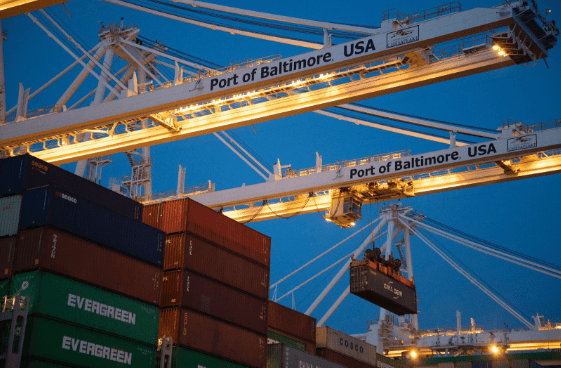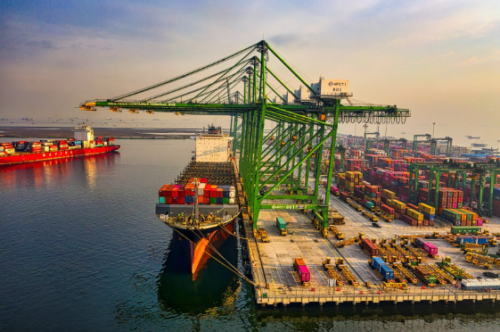Freight Forwarding: Meaning, Stages, and Pros and Cons

Supply chain management is an integral part of any company’s efficiency. Transporting goods from one place to another can be time-consuming and expensive. The process can be complex and challenging, but if you approach it correctly, it will go smoothly and leave lasting effects on your overall business.
Many companies employ third-party logistics services to handle the heavy lifting. That’s where freight forwarding comes into play. It is essential to supply chain management because it involves transporting and delivering shipments.
Read on for everything you need to know about freight forwarding: what it is, how it works, and the pros and cons involved.
Freight Forwarding Meaning
Freight forwarding refers to the coordination of transportation. It is a service that assists with shipping goods from one place to another through a single or multiple carriers. The service may utilize air, marine, road, or rail transportation.
Freight forwarders are an alternative to shipping goods yourself. The service providers offer the space needed to ship the items and help with documents, customs clearance, and insurance.
Freight forwarding streamlines the shipping process and helps you avoid international restrictions and tariffs. It also allows businesses to focus on other aspects of their operations.
The Stages of Freight Forwarding
The first step to initiate a freight forwarding project would be to determine your company’s needs and what you are shipping. Here is a list of the six stages that will help you choose the best logistics services for your business:
Export Haulage
Export Haulage refers to transferring goods from a shipper’s premises to a freight forwarder’s warehouse. It is the first step in freight forwarding and involves packing, booking, and preparing cargo for international shipment.
The export haulage’s responsibility falls on the shipper or the consignee, depending on the agreement. For example, the contract may state that the consignee assumes responsibility for the shipment from the shipper’s address.
If it is your responsibility, you’ll need to ensure your products are packaged correctly and delivered to a freight forwarder for international transportation. You can opt for a local transporter to ferry your shipment to the freight forwarder.

Items Checkpoint
Items Checkpoint is the second step in the freight forwarding process. Upon receipt, international freight forwarders check the shipment’s contents to ensure that they are the same as what was originally shipped.
The items checkpoint helps ensure that the items are packed, labeled, and ready to travel. This process involves scanning your products for export compliance and making sure your shipment’s components are not prohibited.
The freight forwarders will check for any damages and missing parts. They will notify you of any changes to the original plan and offer advice on options to fix any problems. You will likely need to replace the shipment if there are any issues.
Export Customs Clearance
Export Customs Clearance refers to getting samples approved by the customs authority. Each country has its own set of international regulations and requirements.
The required documentation differs depending on the country to which you’re shipping. Most freight forwarders have customs specialists on staff who oversee your product’s export.
Some countries require customs brokers to undergo training and obtain special licenses to handle international shipments. They’ll ensure no violation or regulations occur during the export process.
Import Customs Clearance
Import customs clearance refers to getting your international shipment approved by the customs authority in the receiving country. Governments have regulations to ensure you have all necessary import licenses, permits, and certificates.
In some cases, freight forwarders may handle this step for you. They can help you with the documentation required to ensure your shipment is legally allowed into the country.
Final Destination Arrival and Handling
The final destination arrival concerns handling and transferring your shipment to the freight forwarder. Before you can ship your goods, you must arrange a secure and protected delivery location.
Your forwarder will pick up your shipment from the final destination or arrange a transportation company to ensure the safe arrival of your parcel. After it arrives, they’ll unload it and prepare it for shipment.
Import Haulage
Import Haulage is when your shipment arrives at its place of delivery. It refers to transferring goods from international freight forwarders to the client.
Import haulage is crucial in freight forwarding because it ensures that your shipment and its components arrive in one piece. This responsibility falls on your freight forwarder, but they can hire a local transporter to handle the process for you.
Pros of Using Freight Forwarding Services

The many benefits of using freight forwarders include:
Experience and Accountability
Freight forwarders offer experience and accountability. These service providers will help you with any shipment issues, even those with international shipping regulations.
Access to Global Partners
Freight forwarders provide access to global partners. They have experience in various industries, including manufacturing, fashion, and food. They can assist you with importing or exporting your goods or provide you with contacts and access to foreign distributors.
Cost-Effective
Freight forwarders offer discounted rates for the international transportation of your products. They have relationships with carriers, allowing them to negotiate lower transport costs for their clients.
Accurate Documentation
Through experience and training, freight forwarders provide accurate documentation for customs regulations and cargo insurance. Many freight forwarders have customs specialists who can oversee your product’s export from the shipper’s address.
Compliance
The freight forwarder ensures your shipment adheres to the documentation regulations for importing and exporting your goods. They can help ensure that the products meet any requirements specified by the customs authority in the country you’re shipping them to.
Technology: Cargo Tracking
Technology is also an essential component of forwarding services. With modern-day technology, you can track your shipment throughout its route and always know where it is.
Versatility and Flexibility
Freight forwarders provide flexibility and versatility to clients. You can choose from various options for your shipment, including transportation options. Your freight forwarder also can recommend the best configuration for your shipment to ensure its safe transport and timely arrival.
Cons of Using Freight Forwarding Services
Freight forwarders come with their own set of drawbacks, including:
Reliance on Forwarder Assistance
Shippers may develop an unhealthy relationship with their freight forwarders. Instead of creating the needed competencies and resources to be an independent shipper, you’ll likely develop a dependence on your freight forwarder.
Price Gouging
Freight forwarding is not cheap, and it’s prone to price gouging. The price of your shipment will depend on the distance it travels, weight, size, and destination delivery site. When demand is high, you’ll likely pay more.
Possible Product loss
Freight forwarders sometimes lose shipments. If your container load is sent to the wrong address or delivered to someone else, you could lose a lot of money, and it may damage your reputation.
Industries That Use Freight Forwarders
Several industries use freight forwarders, including:
Manufacturing
Manufacturers of various products use freight forwarders to get their products to the market. They may have distributors in multiple countries to distribute their products, but they can’t ship the cargo themselves due to legal and logistical concerns.
Pharmaceutical
Drug manufacturers and distributors employ freight forwarders to get their products overseas. The transportation process and delivery of drugs are sensitive because international governments treat them as controlled substances.
Medical
Medical companies use freight forwarders to send medical equipment overseas. These companies must ensure that their products deliver in original packaging, have proper documentation and insurance information, and reach the correct location within the specified time frame.
E-commerce
The e-commerce industry has grown significantly over recent years with increased internet usage. Retailers use freight forwarders to handle the international shipping of their products. They have many distribution centers and need to ship products that have a high degree of quality and must arrive on time.
Construction
Construction projects may require the import of materials that are not available locally or the export of products created for specific overseas projects. These materials may be sensitive or hazardous, so the project owner may hire a freight forwarding company to handle the shipping details.
Fashion
Fashion companies use freight forwarders to get their products overseas to foreign markets. These companies have complex supply chains that need balance for cost-effective transfer and competitive pricing of the products.
Final Thoughts
Freight forwarding has changed significantly in the last few decades. They’re now a mainstream business that many clients use for specific shipments, notably those involving international shipments.
